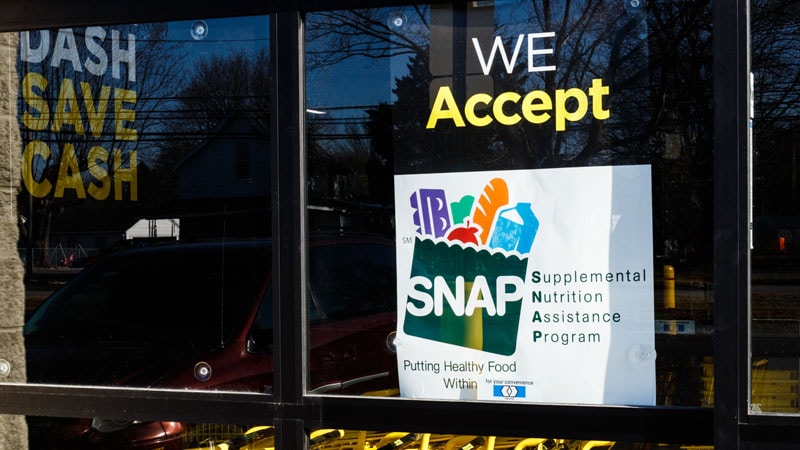Nutrition assistance programs do more than fighting hunger. They also may help guard against age-related cognitive decline.
Researchers found that people who participated in the US Supplemental Nutrition Assistance Program (SNAP) had slower cognitive decline over 10 years than peers who did not participate in the program.
“The chief policy implication of our study is that nutrition assistance programs like SNAP are not just anti-hunger tools — they are also public health tools that may help protect cognitive function and promote healthy aging,” lead author Linlin Da, MPH, PhD candidate, University of Georgia College of Public Health, Athens, Georgia, told Medscape Medical News.
The study was presented on July 30 at the Alzheimer’s Association International Conference (AAIC) 2025.
Healthy Food, Healthy Brain
Using the nationally representative Health and Retirement Study, researchers analyzed a racially and ethnically representative group of people aged 50 years or older.
They compared 1131 individuals (mean age, 63 years) who were enrolled in SNAP in 2010 to 1216 individuals (mean age, 66 years) who were eligible for SNAP but did not participate in the program.
“Our study focused on SNAP — a real-world, policy-level intervention — rather than just individual food choices,” Da noted.
As part of the study, memory and executive function were assessed every 2 years between 2010 and 2020 via telephone or web-based interviews. Individuals with an initial cognition summary score indicating cognitive impairment or dementia were excluded from the analysis.
The researchers found that SNAP participants had a 0.10% slower decline in overall cognitive function (P < .001), or 2-3 additional years of cognitive health over the 10-year period.
“For someone starting at a healthy cognitive score, this slower decline could delay reaching the threshold for mild cognitive impairment by nearly a decade,” Da noted in a conference statement.
SNAP participants also had a slower decline in memory (P < .001) and executive function (P = .004) than peers not enrolled in SNAP.
“Our study is one of the first long-term, nationally representative studies to show that participation in a federal nutrition assistance program like SNAP is associated with slower cognitive decline in older adults,” Da told Medscape Medical News.
Da said there are several biological and social mechanisms that may explain how SNAP participation slows cognitive decline, including improved nutrition.
“SNAP increases access to nutrient-dense foods that support brain health — such as fruits, vegetables, whole grains, and lean proteins. Better nutrition is linked to reduced inflammation, improved vascular health, and preservation of cognitive function over time,” Da explained.
Reduced food insecurity and stress is another possibility. “Chronic food insecurity is a significant source of psychological stress, which can negatively impact brain function. SNAP helps alleviate financial and emotional strain, leading to lower levels of chronic stress and potentially reducing harmful stress-related effects on memory and executive function,” Da said.
“We hope healthcare providers will see that potentially delaying cognitive impairment is another reason to help their patients-in-need secure access to food assistance,” co-author Suhang Song, PhD, assistant professor, Department of Health Policy and Management,
University of Georgia College of Public Health, added in a conference statement.
Equity Gaps
While all racial and ethnic groups benefitted from SNAP participation, the protective effects on cognitive decline were smaller among non-Hispanic Black and Hispanic older adults compared with non-Hispanic White participants.
There were “racial and ethnic disparities in the cognitive benefits of SNAP, which points to important equity gaps in how nutrition policies may impact different populations,” Da said.
“We guess, even with SNAP, living in food deserts or areas with fewer healthy food options may limit the quality of nutrition people can access. This can especially affect Black and Hispanic communities, where structural barriers to healthy eating persist,” Da said.
Commenting on this study for Medscape Medical News, Courtney Kloske, PhD, director of Scientific Engagement for the Alzheimer’s Association, said it “highlights the importance of nutritious foods and the impact that can have on the brain.”
Maria Carrillo, PhD, chief science officer and medical affairs lead, Alzheimer’s Association, noted that food insecurity can negatively affect cognitive function, and this is one of the first long-term studies to show that food assistance programs can positively impact cognition.
“Simple, everyday actions can make a difference in brain health and may even lower the risk of Alzheimer’s disease and dementia. The Alzheimer’s Association is committed to helping all people build these habits into their daily lives, including eating right, one of our 10 Healthy Habits for Your Brain,” Carrillo said in a statement.
The authors, Kloske and Carrillo, reported no disclosures.
